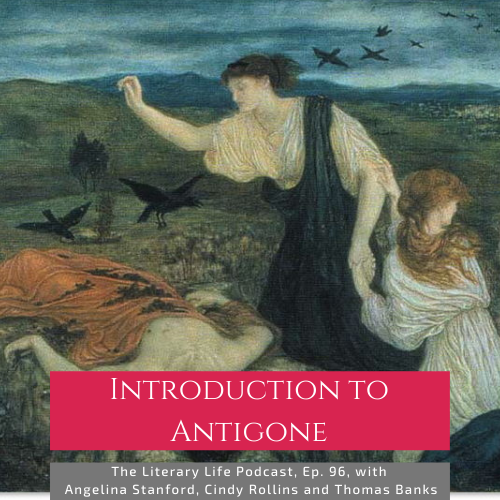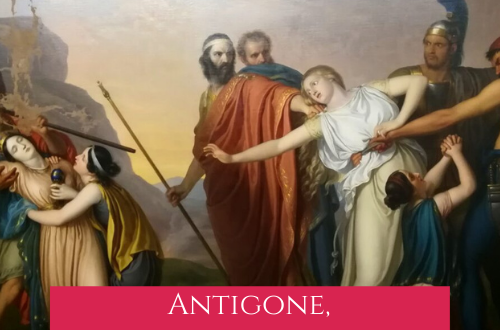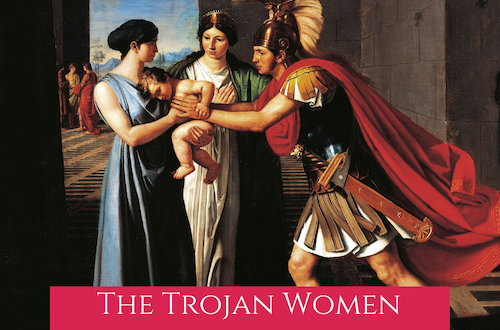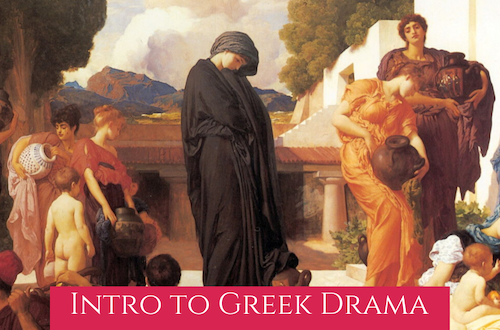
Episode 96: Introduction to Antigone
Welcome to the first episode in our series on Sophocles’ Greek drama Antigone. After sharing a little about their background with this play, Angelina, Cindy and Thomas talk about the overall structure and the conventions of Greek Drama and Greek Tragedy. Thomas also gives an overview of the type of characters to expect in Greek Tragedy, and he highlights the ways in which Sophocles changed Greek Drama. Angelina explains the ideas of unity of time, unity of place, and unity of plot as presented by Aristotle. Thomas also summarizes the myth on which this play is based, talks about Creon’s character, and expands on some of the tensions present in Antigone.
Listen to The Literary Life:
Commonplace Quotes:
You don’t know what ideas my mind-spirit needs right now; I don’t know what your mind-spirit need; and we don’t know the mind-spirit needs of each child in a classroom. Vital ideas are not sold pre-measured in a bottle.
Anne White
She had a terror of solitary evenings, all the terror of one who did not care for books, who was soaked in superstition and loved lights and noise.
Hugh Walpole
When we are self-conscious, we cannot be wholly aware; we must throw ourselves out first. This throwing ourselves away is the act of creativity. So, when we wholly concentrate, like a child in play, or an artist at work, then we share in the act of creating. We not only escape time, we also escape our self-conscious selves.
The Greeks had a word for ultimate self-consciousness which I find illuminating: hubris: pride: pride in the sense of putting oneself in the center of the universe. The strange and terrible thing is that this kind of total self-consciousness invariably ends in self-annihilation. The great tragedians have always understood this, from Sophocles to Shakespeare.
Madeleine L’Engle
A Scot to Jeanne D’Arc
by Andrew Lang
DARK Lily without blame,
Not upon us the shame,
Whose sires were to the Auld Alliance true;
They, by the Maiden’s side,
Victorious fought and died;
One stood by thee that fiery torment through,
Till the White Dove from thy pure lips had passed,
And thou wert with thine own St. Catherine at the last.
Once only didst thou see,
In artist’s imagery,
Thine own face painted, and that precious thing
Was in an Archer’s hand
From the leal Northern land.
Book List:
Ideas Freely Sown by Anne White
The Thirteen Travellers by Hugh Walpole
The Sea Tower by Hugh Walpole
A Circle of Quiet by Madeleine L’Engle
The Great Divorce by C. S. Lewis
The Oresteia by Aeschylus
The Three Theban Plays by Sophocles
Mythology by Edith Hamilton
The Poetics by Aristotle
Trojan Women by Euripides
The Bacchae by Euripides
Support The Literary Life:
Become a patron of The Literary Life podcast as part of the “Friends and Fellows Community” on Patreon, and get some amazing bonus content! Thanks for your support!
Connect with Us:
You can find Angelina and Thomas at HouseofHumaneLetters.com, on Instagram @angelinastanford, and on Facebook at https://www.facebook.com/ANGStanford/
Find Cindy at morningtimeformoms.com, on Instagram @cindyordoamoris and on Facebook at https://www.facebook.com/cindyrollins.net/. Check out Cindy’s own Patreon page also!
Follow The Literary Life on Instagram, and jump into our private Facebook group, The Literary Life Discussion Group, and let’s get the book talk going! http://bit.ly/literarylifeFB
Subscribe to The Lit Life:









2 Comments
Clifford Humphrey
To whom it may concern,
I would like to know the translation you used for the Antigone discussion. The titled hyperlinked on the page is to an edition in Finnish.
Thank you!
admin
Wow! I’m not sure how that happened, but I have fixed it now! Thanks for the heads up!